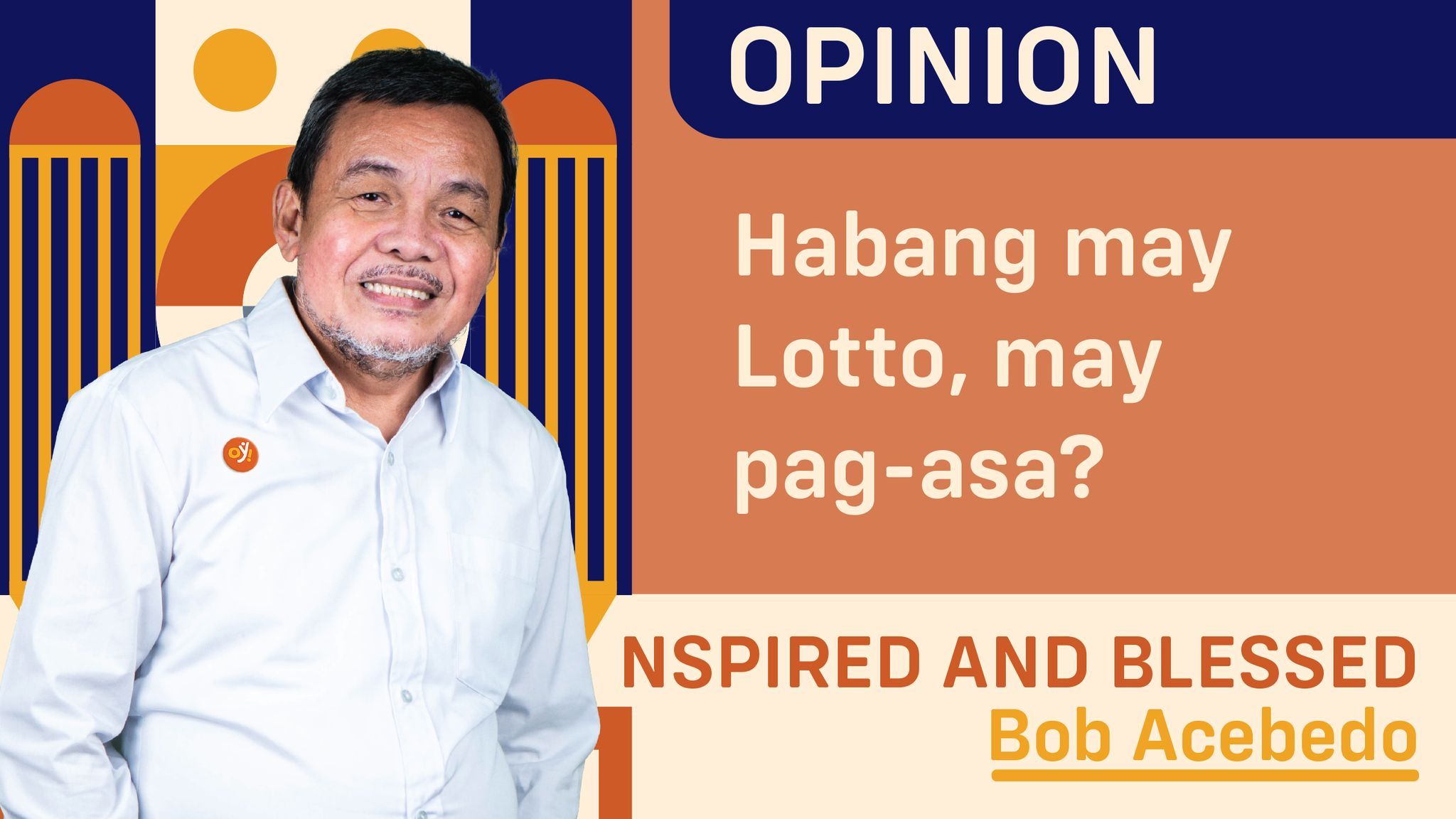“Habang may Lotto, may pag-asa,” thus quipped my 46-year-old tricycle driver friend, Nerio (not his real name).
Feeling queasy about what he said, I further pried and he explained, “Anak ng xxx naman, ang kita ko sa araw-araw, bawas na ang gasolina at boundary, ay kulang na kulang pa sa aming pagkain at dalawang anak na nag-aaral, at napakamahal pa ng mga bilihin. Kaya, ang natitira kong pera pag-uwi sa bahay, imbis na ipang-inom, ay tinataya ko na lang sa Lotto. Malay natin, baka swertihin tayo.”
“Magkano ba tinataya mo?” I asked. “Hindi ako lumalampas ng P100.00,” he replied.
Then, I added, “Di mo ba alam na ang tsansa mong manalo kahit sa 6/42 lang ay isa sa mahigit limang milyon na taya?”
“Oo, isa lang. At yung isa na yun ay pwede pa ring sabihing pag-asa. At pag hindi ngayong araw, bukas may Lotto pa naman…kaya, habang may Lotto, may pag-asa,” Nerio explained.
Holy cow! I got pointedly struck by Nerio’s reasoning – prompting me to scour for whatever philosophical, sociological, political, psychological, or any other underpinning explanation behind his “hopeful” sigh.
On first reckoning, Nerio’s “argument” is not totally devoid of logic. Yes, the odds of winning or getting all the six-numbers of the Lotto games are extremely sky-rocketing: 1 in 5,245,786 for 6/42; 1 in 8,145,060 for Mega Lotto; 1 in 13,983,816 for Super Lotto; 1 in 28,989, 675 for Grand Lotto; and 1 in 40,475,358 for Ultra Lotto.
But, despite these “millions of odds”, there is yet one chance – and this one, single chance can still pass as “pag-asa” or hope.
Might be dismissed as false hope? Or, “hoping against hope”?
Perhaps, yes. But, in Nerio’s pragmatic perspective, a faintest hope is still hope, and is certainly NOT rendered as completely meaningless. In a sense, it’s either we are saved by even just a faintest hope or we condemn ourselves to meaninglessness.
Lest, as my good philosopher-priest friend wrote in his FB post, “If there is really nothing to hope for in the ultimate sense of hoping, then is all of life’s journey simply a confirmation of Job’s lament for human life as a drudgery or Qoheleth’s cry that all is vanity, or Shakespeare’s ‘much ado about nothing’?”
But, wait still. This is only good if the Lotto draw is not rigged or manipulated. However, in the light of the recent PCSO games amid allegations of “manipulation” on the frequent winnings of Lotto games with huge amounts of jackpot prizes, the remaining one single chance or “pag-asa” of Nerio, or of any other hapless Juan Dela Cruz, may just as well vanish into oblivion.
On second reckoning, Nerio’s “habang may Lotto, may pag-asa” disturbing relief may just as well be indicative of our society’s perceptible ills – crunching stomachs due to sky-high prices of commodities, economy in the doldrums, high incidence of poverty and unemployment, poor delivery of basic services, political stability flouncing to the seams, and other what-nots.
Ponder so, Nerio’s odd optimism may be inferred as a surreal expression of “hope in a hopeless world”? Perhaps, like what Karl Marx of long ago said of religion, Lotto may also be mused as “the sigh of the oppressed creature, the heart of the heartless world, the spirit of a spiritless situation. It is the opium of the people.”
Whilst, government says revenues from the Lotto go to social services programs or “charity” – which the PCSO stands for. Howbeit, it is important to underscore that despite the flaunted coughing up in revenues purportedly for social services programs, the government cannot remain unsullied to legalized gambling’s despicable consequences – political patronage, graft and corruption, bureaucratic mismanagement, and other undesirable upshots, let alone social services or “charity” cadged from or thriving on peoples’ faintest hope (or to borrow Marx’s phrase, “opium of the masses”).
But, “opium of the masses” or not, heartless and spiritless or not, I must confess that I too is an avid (nay “addict”, because my maximum regular bet is only one six-number combination for a paltry P20.00) Lotto bettor. My reason, hypocrisy discarded, is perhaps resonated by Nerio’s “faintest hope”. In other words, in matters of Lotto, I don’t gamble – I just play.
Thence, when does Lotto become gambling – for which reason the Church is wont to raise her brows?
Games of chance, like lottery, are not intrinsically evil (Catechism of the Catholic Church or CCC #2404).
But, where do we draw the line? Let me quote the following profound lines from an anonymous Catholic writer from the Internet:
“A person may only engage is such activities (games of chance) with strict adherence to virtue. First, he must act with temperance, whereby he keeps his passions and emotions under the control of reason, acts with moderation, and uses material goods in a good way and in accord with the circumstances of his life.
“Second, the virtue of justice governs both the game itself as well as the person playing the game. The game must be fair and all players must have an equal chance of winning. In justice, the player’s gambling must not prevent him from meeting his obligations to support himself or his family, pay his debts, or fulfill other responsibilities.
“Consequently, a person must be careful not to become addicted to gambling, because of its excitement or the possibility of making ‘quick, easy, big money’. He must not risk money that is necessary for the livelihood of himself or those entrusted to his care. Moreover, a gambler should always weigh whether that money could be better used for something of clear, tangible benefit. Even a wealthy person who may have great disposable income must use moderation, recognizing that the money risked on frivolous gambling could be used to help those less fortunate.”
So, is there hope in Lotto? Yes, a faintest one. For that, I’m gonna wager my P20.00 bet.
#InspiredAndBlessed #BobAcebedo #HabangMayLottoMayPagasa? #Hope #Lotto #OpinYonColumn #OpinYon #WeTakeAStand
